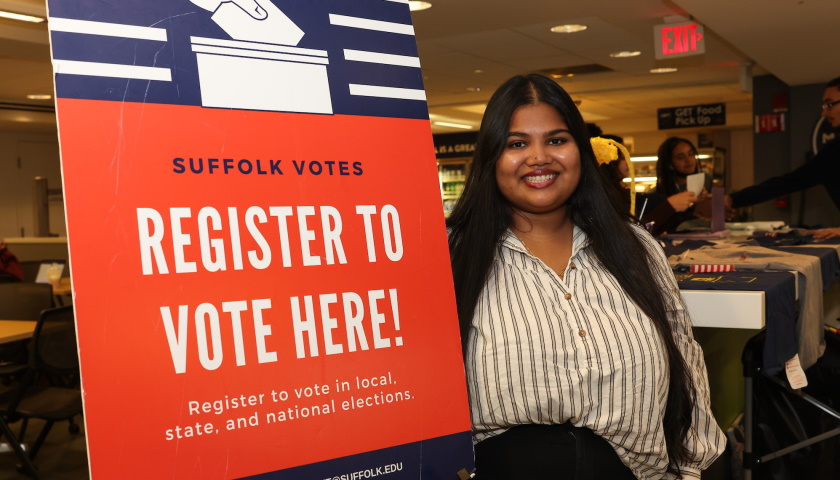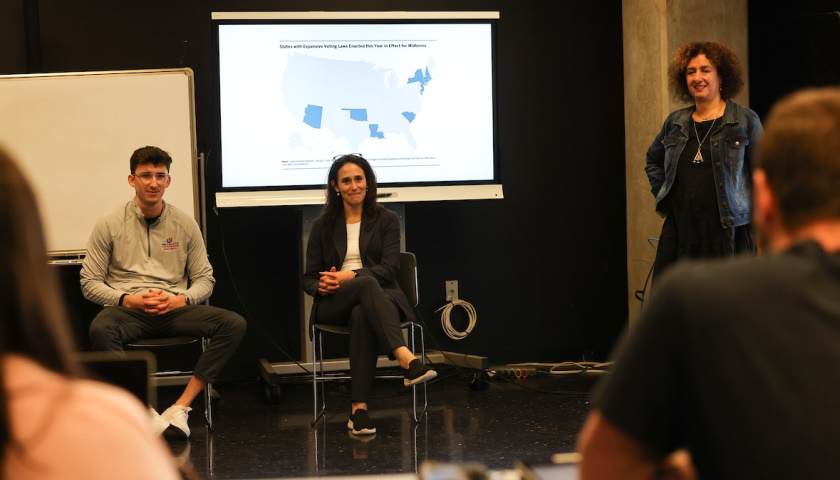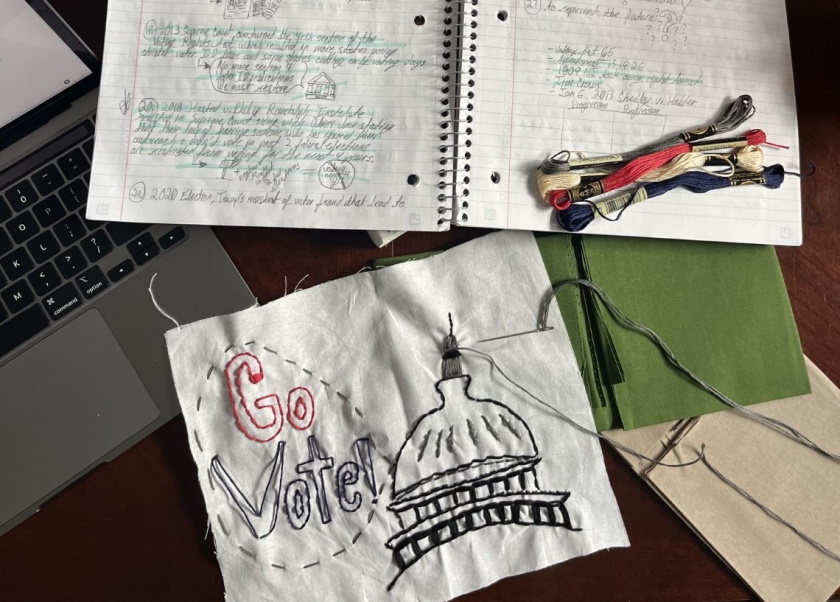Every vote counts—but only if someone is there to process it.
On Election Day most voters are understandably focused on the candidates and questions on their ballots. But to ensure a functioning US democracy, attention must also be paid to the workers who hand out those ballots, check in each voter, and tally the votes. They keep elections running smoothly, and they are under threat.
“In 2020, in the midst of a pandemic and a presidential election that captured the nation’s attention, citizens across the country stepped up to the plate to serve as poll workers and election workers,” says Rachael Cobb, professor and chair of Suffolk University’s Political Science & Legal Studies Department.
But just two years later, many election workers and poll volunteers across the country have resigned due to threats and harassment, says Cobb. She points to a recent bulletin from the Department of Homeland Security, FBI, and the National Counterterrorism Center obtained by media outlets that warns of a heightened threat to election workers “fueled by a rise in domestic violent extremism and driven by ideological grievances and access to potential targets.”
Filling a widening gap
This year, students in Cobb’s Voting Rights & Election Law course are stepping in to help by collaborating with the university wide effort, Suffolk Votes, educating and registering student voters, organizing “voter walks” on Election Day to help students find their voting locations, and volunteering to staff the polls themselves. Nineteen Suffolk Votes Ambassadors visited more than 50 classrooms this semester, helping to reach over 1,000 students. It’s youth involvement like this, says Center for Community Engagement director Adam Westbrook, that has helped increase the number of 18-24 year-old registered voters in Massachusetts by 33% from the last midterm election in 2018.

Junior political science major Syeeda Rahman is looking forward to her 6 a.m. to 9 p.m. shift at the polling location in her East Boston neighborhood.
Election Day is always busy for Rahman. As the current Suffolk Votes scholar, she plays an important leadership role in campus voter registration and outreach. And working with the nationwide, nonpartisan nonprofit Vot-ER she’s helped healthcare providers register patients to vote in important swing states such as Pennsylvania and Georgia. Now she’s excited for the opportunity to facilitate democracy in action.
“I’ll be working as an inspector, helping people check in, making sure ballots are filled in correctly, and procedures are followed,” says Rahman. “Boston really struggles to get enough poll workers. During my training, the leaders talked about pulling some workers out of retirement to help.”

Cobb started the University Pollworkers Project in 2006, partnering with Mass VOTE and local colleges and high schools to recruit students to serve as poll workers and educate them about their role in the electoral process. At that time, the main goals were increasing youth engagement and addressing the rapidly aging population of poll workers. Those issues persist, and have been exacerbated by the pandemic and, now, safety concerns for election workers.
Steven Murnane, who’s in his fourth year of Suffolk’s 4+1 bachelor’s/master’s program in political science, witnessed these struggles firsthand while working as an assistant registrar of voters for the City of Boston during the most recent mayoral election. He currently serves on the SPARK Council, which advises the mayor on City policies and programs affecting 20- to 35-year-olds. He’s sharing his experience and concerns about threats to the election process in a series of articles for the Suffolk Journal leading up to the midterm election.
Murnane, who is from New Hampshire, enrolled in the Voting Rights & Election law course hoping to learn more about election processes in other states. He wanted to understand how election deniers and conspiracy theorists can believe in claims of widespread voter fraud, since the rigorous election management processes he’s witnessed makes such ideas seem impossible.
“The idea of changing even one vote with that process in place would be so difficult,” he says. “To try to change an entire election outcome? I couldn't even comprehend how that could happen.”
Learning about the diverse, complex, and sometimes rapidly changing rules in place in other states—and that partisan election officials sometimes have great influence over those processes—was eye-opening for Murnane. “We learned that the elections departments are being gutted in states like Nevada, and that's pretty scary because these operations are like a well-oiled machine. If you take out a couple of pieces, it's not going to work.”

Learning from history, looking toward the future
First-year student Bianca Munoz will cast her first-ever vote in the 2022 midterm election. She’ll also be spending the day serving as a poll worker.
As a first-generation American, Munoz says she feels empowered to be taking part in the election process, and energized by the other students in the Voting Rights & Election Law course who’ve shared their experiences working on campaigns and in government.
“It can be disheartening as a young person to see so much in the news [about potential election-related violence],” she says. “I’m grateful for this course because it’s important to know the history so I have a foundation to talk about these issues. Seeing fellow students who want to make a difference and are already making an impact is inspirational to me.”
Get involved
Suffolk is consistently ranked among the best colleges for student voting—and that’s just one way to get involved. Stay informed and engage with the political process by:
- Learning more about Suffolk Votes and becoming a student ambassador;
- Keeping up on important election cycle events and dates;
- Attending this semester’s virtual open classroom sessions, Our Issues, Our Voices, Our Votes: Youth Civic Participation Today presented by the GBH Forum Network, Ford Hall Forum at Suffolk University, and the Suffolk University Department of Political Science & Legal Studies;
- Catching up on that series, including watching Syeeda Rahman speak about youth engagement during the panel discussion, “Youth Civic Participation: More Than Just Voting”;
- Reading articles on the electoral process in The Suffolk Journal written by students in this semester’s Voting Rights & Election Law course.
Contact
Greg Gatlin
Office of Public Affairs
617-573-8428
Andrea Grant
Office of Public Affairs
617-573-8410



